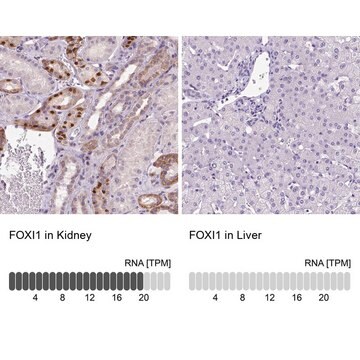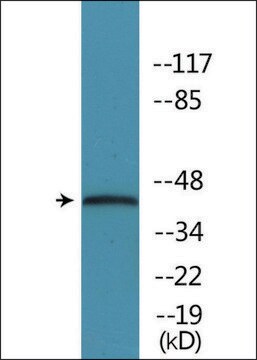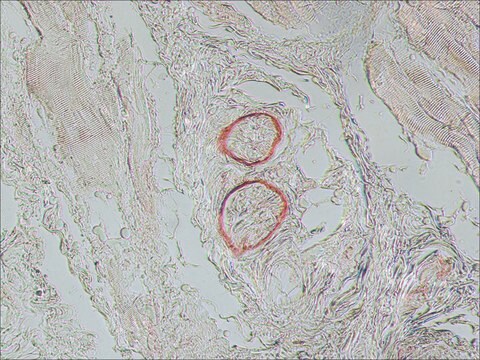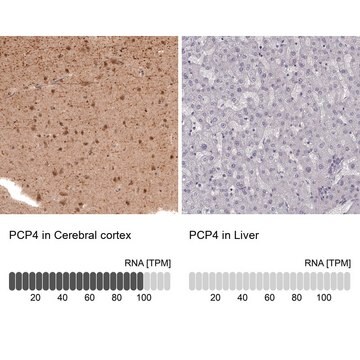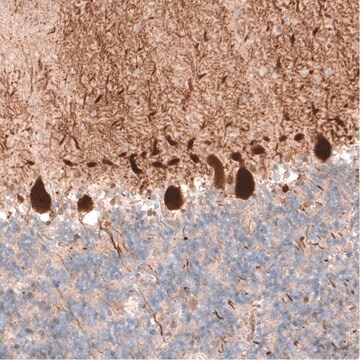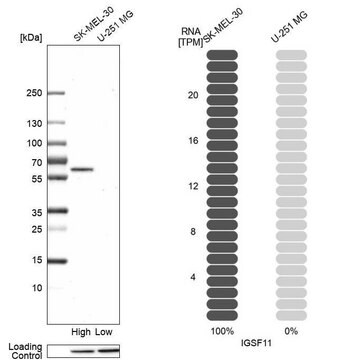SAB4700423
Monoclonal Anti-CD326 antibody produced in mouse
clone VU-1D9, purified immunoglobulin, buffered aqueous solution
Sinonimo/i:
Anti-EPCAM
Autenticatiper visualizzare i prezzi riservati alla tua organizzazione & contrattuali
About This Item
Codice UNSPSC:
12352203
NACRES:
NA.41
Prodotti consigliati
Origine biologica
mouse
Livello qualitativo
Coniugato
unconjugated
Forma dell’anticorpo
purified immunoglobulin
Tipo di anticorpo
primary antibodies
Clone
VU-1D9, monoclonal
Stato
buffered aqueous solution
Reattività contro le specie
human
Concentrazione
1 mg/mL
tecniche
western blot: suitable
Isotipo
IgG1
N° accesso NCBI
N° accesso UniProt
Condizioni di spedizione
wet ice
Temperatura di conservazione
2-8°C
modifica post-traduzionali bersaglio
unmodified
Informazioni sul gene
human ... EPCAM(4072)
Categorie correlate
Descrizione generale
Epithelial cell adhesion molecule (EpCAM) or cluster of differentiation 326 (CD326) is encoded by the 14 kb GA733-2 gene mapped to human chromosome 2p21. Human EpCAM expression is restricted to epithelia of colon, small intestine, lung, kidney, thymus, liver, pancreas, stomach. It is also expressed in several cancers, progenitor and stem cells. CD326 is a transmembrane glycoprotein characterized with an ectodomain, one transmembrane domain, and a 26 residual cytoplasmic domain.
The mouse monoclonal antibody VU-1D9 recognizes an epitope within EGF-like domain I of CD326 / EpCAM, a marker of epithelial lineages. This antibody strongly stains various normal epithelial cells and carcinomas.
Immunogeno
Small cell lung carcinoma cell line H69
Applicazioni
Suggested working dilution for immunoblotting is 1-4 μg/mL of sample. Indicated dilution is recommended starting point for use of this product. Working concentrations should be determined by the investigator.
Azioni biochim/fisiol
Epithelial cell adhesion molecule (EpCAM, CD326) is a transmembrane glycoprotein, involved in several cellular functions, such as epithelial-specific intercellular cell–adhesion, cell signaling, migration, proliferation and differentiation. EpCAM is a dominant surface antigen mapped on human colon carcinoma. It has potential as a diagnostic marker for several carcinomas, including epithelial ovarian cancer (EOC). EpCAM is considered to be a potential target for cancer treatment. EpCAM with the help of components of wnt signal transduction pathway plays a vital role in stem cell signaling.
Caratteristiche e vantaggi
Evaluate our antibodies with complete peace of mind. If the antibody does not perform in your application, we will issue a full credit or replacement antibody. Learn more.
Stato fisico
Solution in phosphate buffered saline, pH 7.4, with 15 mM sodium azide.
Esclusione di responsabilità
Unless otherwise stated in our catalog or other company documentation accompanying the product(s), our products are intended for research use only and are not to be used for any other purpose, which includes but is not limited to, unauthorized commercial uses, in vitro diagnostic uses, ex vivo or in vivo therapeutic uses or any type of consumption or application to humans or animals.
Non trovi il prodotto giusto?
Prova il nostro Motore di ricerca dei prodotti.
Raccomandato
N° Catalogo
Descrizione
Determinazione del prezzo
Codice della classe di stoccaggio
10 - Combustible liquids
Punto d’infiammabilità (°F)
Not applicable
Punto d’infiammabilità (°C)
Not applicable
Scegli una delle versioni più recenti:
Possiedi già questo prodotto?
I documenti relativi ai prodotti acquistati recentemente sono disponibili nell’Archivio dei documenti.
Luojun Chen et al.
Scientific reports, 8(1), 1188-1188 (2018-01-21)
Circulating tumor cells (CTCs) provide a new approach for auxiliary diagnosis, therapeutic effect evaluation, and prognosis prediction for cancer patients. The epithelial cell adhesion molecule (EpCAM)-based separation method (CellSearch) showed good clinical use in multiple types of cancer. Nevertheless, some
Chikako Zen et al.
Liver transplantation : official publication of the American Association for the Study of Liver Diseases and the International Liver Transplantation Society, 17(8), 943-954 (2011-04-15)
We investigated the phenotype of hepatocellular carcinoma (HCC) in livers removed during transplantation after local ablation therapy by transarterial chemoembolization (TACE). This study involved 80 HCC nodules (40 treated with TACE and 40 not treated with local ablation before transplantation)
Carlo Patriarca et al.
Cancer treatment reviews, 38(1), 68-75 (2011-05-18)
Epithelial cell adhesion molecule (EpCAM, CD326) is a pleiotropic molecule that potentially offers therapeutic applications in cancer treatment. Initially described as a dominant surface antigen on human colon carcinoma, it is a transmembrane glycoprotein mediating epithelial-specific intercellular cell-adhesion. Recent data
Gilbert Spizzo et al.
Gynecologic oncology, 103(2), 483-488 (2006-05-09)
Currently available clinical and molecular factors provide still an insufficient prognostic and predictive assessment for patients with epithelial ovarian cancer (EOC). To identify a potential molecular target and prognostic/predictive factor for EOC, we investigated in a retrospective study the prognostic
Graham Carpenter et al.
Cancer cell, 15(3), 165-166 (2009-03-03)
The epithelial-specific cell adhesion molecule (EpCAM) modulates cell adhesion and proliferation. Its overexpression correlates with tumor cell proliferation, and EpCAM is a therapeutic target. In the February issue of Nature Cell Biology, Maetzel et al. demonstrate that proliferative responses to
Il team dei nostri ricercatori vanta grande esperienza in tutte le aree della ricerca quali Life Science, scienza dei materiali, sintesi chimica, cromatografia, discipline analitiche, ecc..
Contatta l'Assistenza Tecnica.